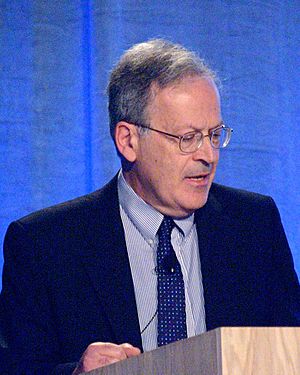Leslie Valiant facts for kids
Quick facts for kids
Leslie Valiant
|
|
|---|---|

Valiant in 2011
|
|
| Born |
Leslie Gabriel Valiant
28 March 1949 Budapest, Hungarian Republic
|
| Nationality | British |
| Education |
|
| Known for |
|
| Awards |
|
| Scientific career | |
| Fields | Mathematics Theoretical computer science Computational learning theory Theoretical neuroscience |
| Institutions | |
| Thesis | Decision Procedures for Families of Deterministic Pushdown Automata (1974) |
| Doctoral advisor | Mike Paterson |
| Doctoral students |
|
Leslie Gabriel Valiant (born March 28, 1949) is a famous British-American computer scientist. He is known for his big ideas in how computers learn and solve problems. He currently teaches at Harvard University. In 2010, he won the Turing Award. This award is like the Nobel Prize for computer science. The Association for Computing Machinery (A.C.M.) said he was a "heroic figure" for his brave and creative ways of solving tough science problems.
Contents
Education and Early Career
Leslie Valiant studied at several top universities. He went to King's College, Cambridge, and Imperial College London. He earned his PhD in computer science in 1974 from the University of Warwick.
Before joining Harvard, he taught at other universities. These included Carnegie Mellon University, the University of Leeds, and the University of Edinburgh. He started teaching at Harvard University in 1982. Today, he is the T. Jefferson Coolidge Professor of Computer Science and Applied Mathematics there.
Big Ideas in Computer Science
Valiant is very well-known for his work in Theoretical Computer Science. This field explores the basic rules and limits of computing.
Understanding Hard Problems
He helped us understand why some counting problems are very hard for computers to solve. He introduced the idea of "Sharp-P-completeness" (written as #P-completeness). This helps explain why certain tasks, like counting many possibilities, are incredibly difficult.
How Computers Learn
Valiant also created the "Probably Approximately Correct" (PAC) model of learning. This was a huge step for Computational Learning Theory. It gave a strong base for how Machine Learning developed. Machine learning is what allows computers to learn from data without being directly programmed for every task.
New Ways to Compute
He also came up with the idea of Holographic Algorithms. These are inspired by how quantum computers might work. They offer new ways to think about solving problems.
Making Computers Work Together
In computer systems, Valiant is famous for the Bulk Synchronous Parallel (BSP) model. Imagine many computers working on one big problem at the same time. The BSP model helps them work together efficiently. Big companies like Google and Facebook have used ideas from BSP for their massive computing tasks. For example, Google uses it for systems like MapReduce and Dataflow. Facebook uses it for analyzing huge amounts of connections. Many open-source projects, like Apache Hadoop and Apache Spark, also use ideas from BSP.
Fast Algorithms and Memory
Earlier in his career, Valiant worked on Automata Theory. This field studies abstract machines and how they process information. He developed a very fast way to analyze sentences in computer languages. This method is still one of the fastest known. He also studies Computational Neuroscience. This area looks at how our brains work, especially how we remember and learn.
Thoughts on Evolution
In 2013, Valiant wrote a book called Probably Approximately Correct: Nature's Algorithms for Learning and Prospering in a Complex World. In this book, he suggests that current ideas about evolution might not fully explain how fast life changes and develops complex features. He believes there's more to understand about the speed of evolution.
Awards and Recognition
Leslie Valiant has received many important awards for his work:
- He won the Nevanlinna Prize in 1986.
- He received the Knuth Prize in 1997.
- The EATCS Award was given to him in 2008.
- His biggest award was the Turing Award in 2010.
He was also chosen as a Fellow of the Royal Society in 1991. This is a very high honor for scientists in the United Kingdom. In 1992, he became a Fellow of the Association for the Advancement of Artificial Intelligence (AAAI). In 2001, he became a member of the United States National Academy of Sciences.
His nomination for the Royal Society praised his work. It mentioned his fast algorithm for language analysis and his #P-completeness idea. It also highlighted his "probably approximately correct learning" idea, which became key for machine learning.
The Turing Award citation recognized his "transformative contributions" to computer science. It specifically mentioned his work on PAC learning, counting problems, and parallel computing.
Family Life
Leslie Valiant has two sons, Gregory Valiant and Paul Valiant. Both of them have also become theoretical computer scientists, following in their father's footsteps.
See also
 In Spanish: Leslie Valiant para niños
In Spanish: Leslie Valiant para niños

